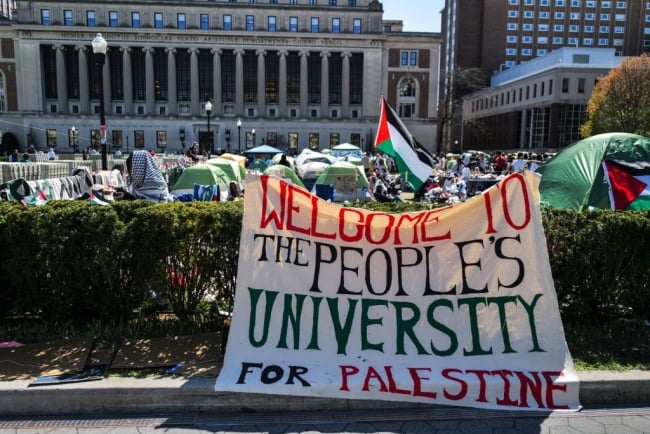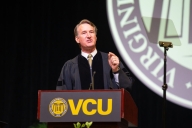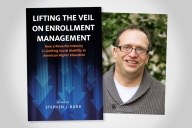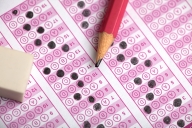You have /5 articles left.
Sign up for a free account or log in.

A sign at Columbia’s encampment welcoming passersby on one of the university’s admitted students days.
Charly Triballeau/AFP via Getty Images
Ethan had been looking forward to Columbia University’s “Days on Campus” event for admitted students ever since he was accepted early-decision in the fall.
But the day before he came up from Baltimore for the visit last month, Ethan, whose last name is withheld for privacy reasons, received an email from the admissions office that the itinerary would be limited this year. A student activities fair was canceled along with several guided tours of campus, which was aflame with the encampment protests that had become the center of national media attention after the April 18 NYPD sweep ordered by university president Minouche Shafik.
“Everything outside of one specific hall was canceled, including a lot of what I was looking forward to, like the activities fair, so that was disappointing,” he said. “I think the concern was protesters might disrupt some of the events, though none of that ended up happening. They maybe also wanted to limit us from interfacing with the protesters too much.”
The protesters, meanwhile, saw a new captive audience in the admitted students cohort. They hung signs exhorting them to “enroll in revolution” on the barricades erected around their encampment. They handed out pamphlets on divestment to receptive students and parents. They even organized an impromptu club fair to replace the canceled one, which Ethan happily attended.
Spokespeople from Columbia did not respond to multiple requests for comment.
The wave of student demonstrations has coincided with a busy season for colleges looking to sell their campuses to accepted students shopping around their options. The protests have disrupted admitted students events and regularly scheduled campus tours, and prompted admissions offices to rethink their normally uncomplicated pitches.
The University of California, San Diego, canceled campus tours for two days last week shortly after students there set up an encampment, a spokesperson confirmed. Protesters at Washington University in St. Louis interrupted a packed admitted students event in the university chapel on April 13, unrolling a banner from the mezzanine and marching onto the stage with a sign that read “Divest from Palestinian Genocide.” At New York University, tours were rerouted during the height of protests to avoid the encampment in the central Gould Plaza.
“This is a challenging time for colleges and universities—all across the nation,” an NYU spokesperson wrote in an email to Inside Higher Ed. “NYU continues to welcome prospective students, as well as newly admitted students who have chosen NYU, and their families to tour and explore our campus.”
Meanwhile, some universities have doubled down on responding to protests and encampments with police force, and hundreds of students and professors across the country have been arrested. Anna Ivey, an admissions consultant and former law school admissions dean at the University of Chicago, said the combination of protesters’ emboldenment and administrative repression has put admissions offices trying to secure their fall cohorts in a difficult spot.
“The admissions office has no control over what the university administration has been doing with respect to the protests, so they’re in the awkward position of trying to recruit this incoming class while all of this is in the news,” she said. “They’re still out there trying to sell.”
Targeting the ‘Money Maker’
Student protesters began to target admissions events before the protest movement was inflamed by Columbia’s crackdown last month. Multiple students who spoke with Inside Higher Ed said they believed the tactic would put pressure on university leaders to respond, while giving them visibility to stakeholders beyond their peers.
“These institutions care immensely about their reputation, and the money they can make from it through tuition,” said Andrew de las Alas, a Wash U student who participated in the April 13 admitted students protest. “Making sure those students and parents were aware of the university’s role in the ongoing genocide, I think, was important, especially before the May 1 [deposit] deadline.”
Ryan, a University of Chicago student whose last name has been withheld for privacy concerns, is straddling both worlds. She’s a campus tour guide—what Chicago calls a “Student Visit Coordinator”—and a protest organizer. She said student activists started targeting admissions activities in early November, when campus protests over Israel-Palestine were beginning to heat up and the busy fall season for campus visits was in full swing.
Protesters gathered in groups at key points where they knew tours usually stopped on their routes, such as the main quad and the art museum courtyard, and waited for tour groups. They’d then begin chanting for the families to hear, sometimes even crafting their messaging to prospective students in particular.
“Where should your tuition go?” they’d ask. “Bombs and killing, hell no!”
“We knew it’d be a particularly big weekend for tours because we had so many on our schedules, and we knew it’d make an impact because it’s essentially targeting the marketing hub of the university,” Ryan said. “This is their moneymaker.”
Spokespeople for the University of Chicago did not respond to multiple requests for comment.
A Hard Sell
For some prospective students, the protests are deeply unsettling; for others, they’re exhilarating. Ethan said that despite the disruptions to admitted students events, the encampment at Columbia was a sign of the vital intellectual and political life he’d been searching for.
“Seeing the commitment so many students had to make sure their voices were being heard, to stand for justice, that was confirmation for me that I’d made the right choice,” he said.
But Columbia’s response to the protests gave him pause. Ethan said he arrived the night before admitted students day and went to check out the campus with his father; the gates were locked, and there were police stationed at every entry point. After reading the news that week about Columbia’s sanctioning of dozens of student arrests, he was a little apprehensive about matriculating in the fall, especially as a politically active student.
“It was a jarring first impression,” he said. “Then after seeing how Columbia called in the NYPD again, and knowing that’s a precedent the university has set—that it’s shown it’s willing to arrest its own students—is very worrying.”
Ivey, the admissions consultant, said parents are disturbed by the use of violent police force on students regardless of their stance on Israel and Palestine.
“No parent wants to see a school and wonder, are they going to sic riot police on my kid?” she said. “Even if you are totally agnostic about the underlying issue, you’re concerned about that.”









